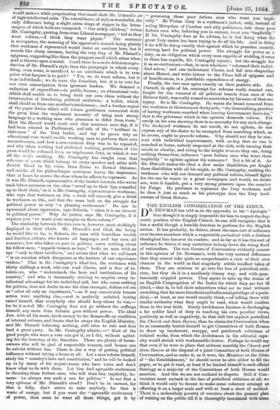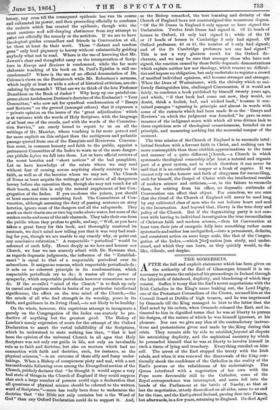THE ENGLISH CONGREGATION OF THE INDEX.
DR. NEWMAN has told ua in the appendix to his " Apologia " that though it is simply impossible for him to respect the dog- matic position of the English Church, he can still recognize that it has a useful though a humble function to perform for the English nation. It has probably, he thinks, about the same sort of influence over its own members which a respectable periodical with a distinct theological line has over its readers ; and so far as it has this sort of influence he thinks it may contribute to keep down the rising flood of rationalism. The two Houses of Convocation evidently concur in this opinion of Dr. Newman's, with the very natural difference that they cannot take quite so comprehensive a view of their own chances in the world as that singularly subtle intellect takes of them. They are anxious to go into the line of periodical criti- cism, but they do it in a needlessly clumsy way, and with spon- taneously crippled powers. They aspire to take up the dutles of an English Congregation of the Index for which they are but ill fitted,—that is, to tell their subscribers what not to read without exercising that far more beneficial andinfluentialprivilege of a perio- dical,—at least, so one would usually think,--of telling them with similar authority what they ought to read, what would confirm them in the true faith. Surely Archdeacon Denison is discharging a far nobler kind of duty in teaching his own peculiar views, positively as well as negatively, in that dull but explicit periodical the Church and State Review, than he claims for Convocation when he so constantly bestirs himself to get Committees of both Houses to draw up incoherent, scrappy, and patchwork criticisms of isolated works, from which the Archdeacon in his editorial capa- city would shrink with workmanlike horror. Perhaps he would say that even if he were to place that arduous monthly the Church and State Review at the disposal of a joint Committee of both Houses of Convocation, and so make it, as it were, the Moniteur or the Globe of " the Establishment," he should never be able either to fill the paper, or to get it read, at least if he limited himself to such official theology as a majority of the Committees of both Houses would sanction. And this we are not inclined to dispute. Still if Con- vocation must embark in the line of periodical criticism at all, we think it would only be decent to make some coherent attempt at effecting it on a larger scale and with at least a show of method. There is a melancholy poverty of resource about the present plan of waiting on the public till it is thoroughly inoculated with some heresy, nay even till the consequent epidemic has run its course and exhausted its power, and then proceeding officially to condemn the malaria which has created the epidemic, though with the most cautious and self-denying abstinence from any attempt to point out officially the remedy or the antidote. If we are to have theological guides counsellors and friends in Convocation at all, let them at least do their work. These " distant and random guns" only lend piquancy to heresy without substantially guiding anybody what not to read. Where is the use of knowing that Mr. Jowett's clear and thoughtful essay on the interpretation of Scrip- ture in Essays and Reviews is condemned, while the far more elaborate teaching of his book on St. Paul's Epistles is still un- condemned? Where is the use of an official denunciation of Dr. Colenso's views on the Pentateuch while Mr. Robertson's sermons, which imply at least as wide a school of historical criticism, are cir- culating by thousands ? What are we to think of the late Professor Donaldson on the Book of Jasher ? Why keep up our painful sus- pense about Archdeacon Denison's doctrine of the Eucharist? " Your Committee," who now ask for synodical condemnation of "Essays and Reviews" on the ground (amongst others) that it expresses a 4‘ private opinion on the issues of the great adjudication' which is at variance with the words of Holy Scripture, with the language of atleast one of the creeds, and with the words of the Commina- tion Service," are surely bound to report to us on all the writings of Mr. Maurice, whose teaching is far more potent and far more explicit on this subject than the ambiguous and pedantic passage quoted from one of the Essayists and Reviewers. Convoca- tion must, in common honesty and faith to the public, appoint a permanent Committee of the Index to warn us of the more danger- ous pitfalls before we fall into them. Let us have official reviews of the worst heretics and " short notices " of the bad pamphlets. Let us have knowledge of the saints whom we may read without fear of coming across anything clearly contrary to the faith, as well as of the heretics whom we may not. The Church of Rome at least acquits the writings of her saints of all dangerous heresy before she canonizes them, though she may not vouch for all their tenets, and this is only the natural supplement of her Con-
gregation of the Index. If you condemn the poison, you should at least sanction some nourishing food. The Committees of Con- vocation, although assuming the duty of passing sentence on stray heretics, ignore most of the dangers and all the safeguards. They mark on their charts one or two big rocks above water, but none of the sunken rocks and none of the safe channels. They take their cue from the public whom they profess to guide, and say, " Well, as you have taken a great fancy for this book, and thoroughly mastered its contents, we don't mind now telling you that it was very bad read- ing for you, though we are unable to say exactly why, or point out any conclusive refutation." A respectable " periodical " would be ashamed of such folly. Hence deeply as we love and honour our Church, we fear we can scarcely admit with Dr. Newman that, as regards dogmatic judgments, the influence of the " Establish- ment " is equal to that of a respectable periodical over its subscribers. It assigns no reasons, which respectable periodicals do ; it acts on no coherent principle in its condemnations, which respectable periodicals try to do ; it wastes all the power of sympathy, which respectable periodicals however censorious never do. If the so-called "mind of the Church" is to flash up only in casual and captious snubs to books of no particular intellectual significance, the effect on the true mind of the Church,—the the minds of all who find strength in its worship, peace in its faith, and guidance in its living Head, —is not likely to be healthy. On the whole, however, this capricious attempt to inaugurate a parody on the Congregation of the Index can scarcely be pro- ductive of anything but the greatest good. The Bishop of London's manly expression of scorn for the attempt of the Oxford Declaration to assert the verbal infallibility of the Scriptures, which he understood to state nothing less than, " that it had been the opinion of the universal Church in all ages that Holy Scripture was not only our guide in life, not only an invaluable rule as to faith and doctrine, but also on matters which had no connection with faith and doctrine, such, for instance, as the physical sciences,"—is an outcome of these silly and fussy under- takings. When a Bishop of conspicuous piety and zeal, with a not inconsiderable following even among the Evangelical section of the Church, publicly declares that " he thought it would argue a very bad state of things in the Church of England if they could suppose that such a large number of persons could sign a declaration that all questions of physical science should be referred to the written word of Scripture,"—more has really been done to undermine the doctrine that "the Bible not only contains but is the Word of God" than any Oxford Declaration could do to support it. And,
as the Bishop remarked, the best learning and divinity of the Church of England have not countersigned this monstrous dogma. " Of the 30 Deans in England 8 only appear to have signed the Declaration. Twelve Irish Deans had signed it. Of 21 heads of houses in Oxford, 13 only had signed it ; while of the 16 or 17 heads of houses in Cambridge 3 only had signed. Of Oxford professors, 40 or 41, the number of 9 only had signed; and of the 29 Cambridge professors not one had signed." This is not a very glorious result for the Oxford de- clarants, and we may be sure that amongst those who have not signed, the reaction caused by these futile dogmatic demonstrations which explain neither law nor theology, which remove no difficul- ties and impose no obligation, but only undertake to register a crowd of ungifted individual opinions, will become stronger and stronger. When the Dean of Westminster, with the chivalry which so uni- formly distinguishes him, challenged Convocation, if it would act fairly, to condemn a book published by himself twenty years ago, and which, "if that book had come out now, they would, no doubt, think a foolish, bad, and wicked book," because it con- tained passages " agreeing in principle and almost in words with some of the extracts which had been made from the Essays and Reviews' on which the judgment was founded," he gave us some measure of the indignant scorn with which all true divines look to these capricious acts of theological censoriousness, founded on no principle, and measuring nothing but the mercurial temper of the moment.
The true mission of the Church of England is to reconcile intel- lectual freedom with a fervent faith in Christ, and nothing can be more contemptible than these childish approximations to the tone and manner of a quite different :Church,—a Church in which systematic theological censorship is:at least a natural and organic part of a great system, and in which therefore it can never be said that it is an outbreak of temper or a freak of caprice. If we cannot rely on the honour and faith of clergymen for reconciling, each for himself, the Gospel of Christ with the intellectual results of modern science and criticism,—or, in the failure to reconcile them, for retiring from his office, no dogmatic outbreaks of Convocation can effect that object. For ourselves, we are sure that the ritual of the Church of England will never be used long by any cultivated class of men who do not believe heart and soul in the Incarnation. And beyond that, liberty is the true duty and policy of the Church. But if the dogmatizing party is not con- tent with leaving to individual investigation the true reconciliation of Christian faith and modern science,—then let Convocation at least turn their jets of energetic folly into something rather more systematic and rather less undignified,—into a permanent, definite, and consistent action on some large scale, like that of the Congre- gation of the Index,—which :the] nation (can study, and under- stand, and which they can learn, as they quickly would, to dis- like, ridicule, and despise.































 Previous page
Previous page